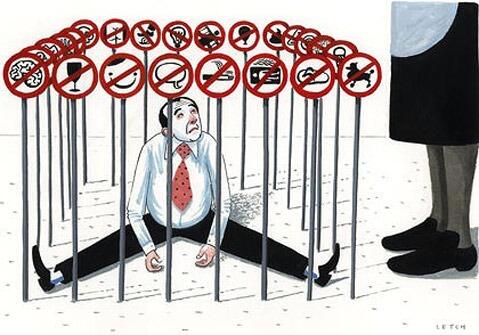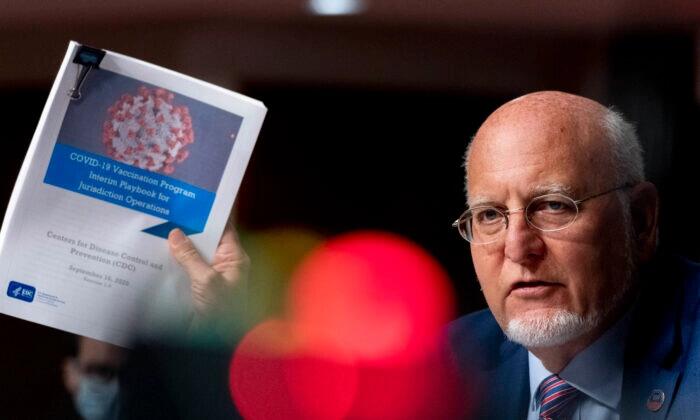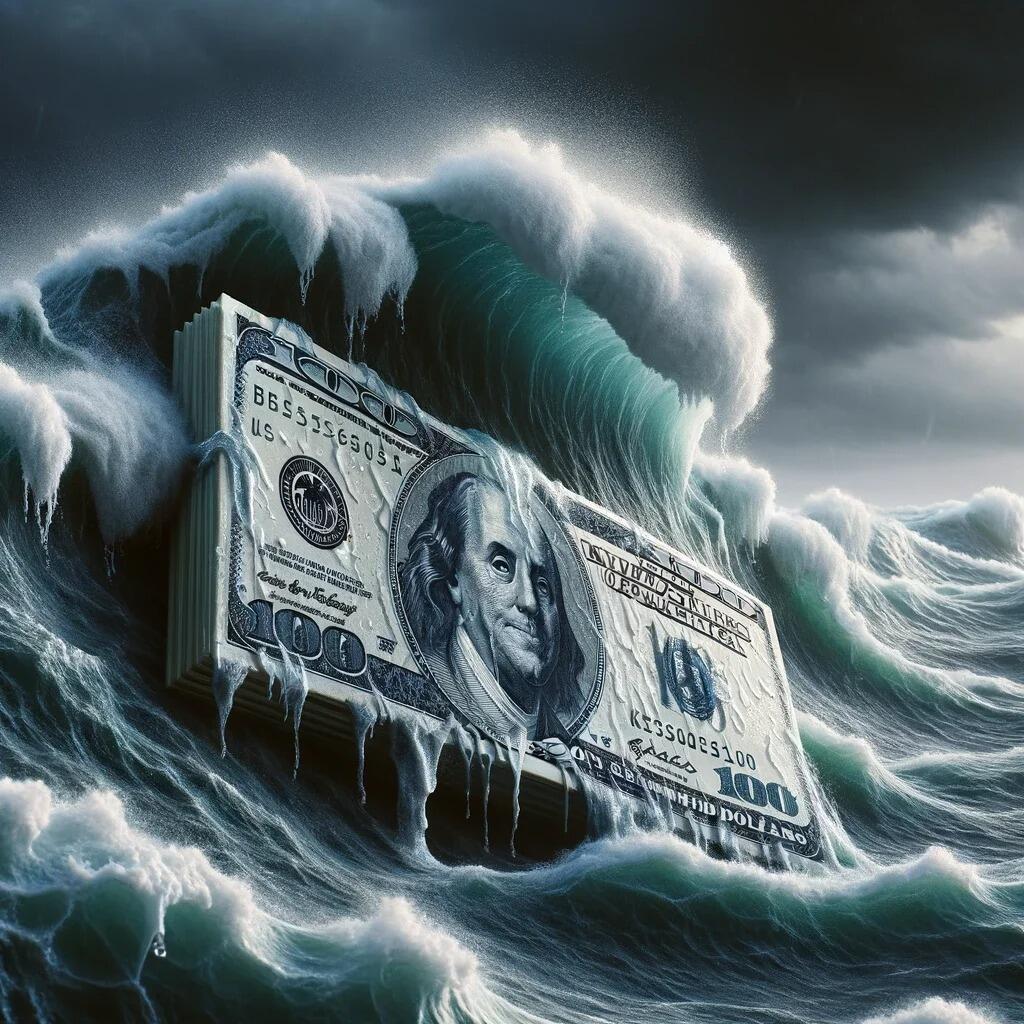The amazing discrepancy between what people want and what they get through the government "nanny state". As laws pile upon laws, life becomes less fun, more regimented and regulated into nothingness. No surprise people spend most of their time indoor, it's a legal jungle outside. Especially if you're black and poor in red states and unless you're black and poor in blue states.
Authored by John & Nisha Whitehead via The Rutherford Institute,
“Whether
the mask is labeled fascism, democracy, or dictatorship of the
proletariat, our great adversary remains the apparatus—the bureaucracy,
the police, the military.”
- Simone Weil, French philosopher
We are caught in a vicious cycle of too many laws, too many cops, and too little freedom.
It’s hard to say whether we’re dealing with a kleptocracy (a government ruled by thieves), a kakistocracy (a
government run by unprincipled career politicians, corporations and
thieves that panders to the worst vices in our nature and has little
regard for the rights of American citizens), or a Nanny State Idiocracy.
Whatever
the label, this overbearing despotism is what happens when government
representatives (those elected and appointed to work for us) adopt the
authoritarian notion that the government knows best and therefore must
control, regulate and dictate almost everything about the citizenry’s
public, private and professional lives.
The government’s bureaucratic attempts at muscle-flexing by way of overregulation and overcriminalization have
reached such outrageous limits that federal and state governments now
require on penalty of a fine that individuals apply for permission
before they can grow exotic orchids, host elaborate dinner parties,
gather friends in one’s home for Bible studies, give coffee to the
homeless, let their kids manage a lemonade stand, keep chickens as pets,
or braid someone’s hair, as ludicrous as that may seem.
As the Regulatory Transparency Project explains, “There are over 70 federal regulatory agencies, employing hundreds of thousands of people to write and implement regulations. Every year, they issue about 3,500 new rules, and the regulatory code now is over 168,000 pages long.”

In
his CrimeADay Twitter feed, Mike Chase highlights some of the more
arcane and inane laws that render us all guilty of violating some law or
other.
As Chase notes, it’s against the law to try to make an
unreasonable noise while a horse is passing by in a national park; to
leave Michigan with a turkey that was hunted with a drone; to refill a
liquor bottle with different liquor than it had in it when it was
originally filled; to offer to buy swan feathers so you can make a
woman's hat with them; to enter a design in the Federal Duck Stamp
contest if waterfowl are not the dominant feature of the design; to
transport a cougar without a cougar license; to sell spray deodorant
without telling people to avoid spraying it in their eyes; and to transport “meat loaf” unless it’s in loaf form.
In such a society, we are all petty criminals.
In
fact, Boston lawyer Harvey Silvergate estimates that the average
American now unknowingly commits three felonies a day, thanks to an
overabundance of vague laws that render otherwise innocent activity
illegal and an inclination on the part of prosecutors to reject the idea
that there can’t be a crime without criminal intent.
The bigger the government grows, the worse the red tape becomes.
Almost
every aspect of American life today, including the job sector, is now
subject to this kind of heightened scrutiny and ham-fisted control.
Whereas 70 years ago, one out of every 20 U.S. jobs required a state license, today, almost 1 in 4 American occupations requires a license.
According to business analyst Kaylyn McKenna, more than 41 states require that makeup artists be licensed.
Twenty-eight states require a license before you can work as a
residential painter. Funeral attendants, whose duties include placing
caskets in visitation rooms, arranging flowers and directing mourners,
have to be licensed to do so in Kansas, Maine and Massachusetts.
The problem of overregulation has become so bad that, as one analyst notes, “getting a license to style hair in Washington takes more instructional time than becoming an emergency medical technician or a firefighter.”
This
is what happens when bureaucrats run the show, and the rule of law
becomes little more than a cattle prod for forcing the citizenry to
march in lockstep with the government.
Overregulation is
just the other side of the coin to overcriminalization, that phenomenon
in which everything is rendered illegal, and everyone becomes a
lawbreaker.
As policy analyst Michael Van Beek warns,
the problem with overcriminalization is that there are so many laws at
the federal, state and local levels—that we can’t possibly know them
all.
“It’s also impossible to enforce all these laws. Instead,
law enforcement officials must choose which ones are important and
which are not. The result is that they pick the laws Americans really
must follow, because they’re the ones deciding which laws really matter,”
concludes Van Beek. “Federal, state and local regulations — rules
created by unelected government bureaucrats — carry the same force of
law and can turn you into a criminal if you violate any one of them… if
we violate these rules, we could be prosecuted as criminals. No matter
how antiquated or ridiculous, they still carry the full force of the
law. By letting so many of these sit around, just waiting to be used
against us, we increase the power of law enforcement, which has lots of options to charge people with legal and regulatory violations.”
Case in point: in New Jersey, in what journalist Billy Binion describes as “yet another example of the effects of overcriminalization, which increases interactions between civilians and police with little benefit to actual public safety,”
police went so far as to arrest a teenager and seize other teen’s
bicycles for so-called traffic violations and a failure to register
their bikes with the state.
This is the police state’s superpower: it has been vested with the authority to make our lives a bureaucratic hell.
That explains how a fisherman can be saddled with 20 years’ jail time for throwing fish that were too small back into the water. Or why police arrested a 90-year-old man for violating an ordinance that prohibits feeding the homeless in public unless
portable toilets are also made available. Or how states across the
country, in a misguided attempt to disperse homeless populations, have criminalized sitting, sleeping, or resting in public spaces; sharing food with people; and camping in public.
The laws can get downright silly.
For instance, in Florida, it’s against the law to eat a frog that was used in a frog-jumping contest.
You could also find yourself passing time in a Florida slammer for such
inane activities as singing in a public place while wearing a swimsuit,
breaking more than three dishes per day, farting in a public place after 6 pm on a Thursday, and skateboarding without a license.
“Such
laws,” notes journalist George Will, “which enable government zealots
to accuse almost anyone of committing three felonies in a day, do not
just enable government misconduct, they incite prosecutors to intimidate
decent people who never had culpable intentions. And to inflict
punishments without crimes.”
Unfortunately, the consequences are all too serious for those whose lives become grist for the police state’s mill.
In this way, America has gone from being a beacon of freedom to a locked down nation.
We
labor today under the weight of countless tyrannies, large and small,
carried out in the so-called name of the national good by an elite class
of governmental and corporate officials who are largely insulated from
the ill effects of their actions.
We increasingly find ourselves
badgered, bullied and browbeaten into bearing the brunt of their
arrogance, paying the price for their greed, suffering the backlash for
their militarism, agonizing as a result of their inaction, feigning
ignorance about their backroom dealings, overlooking their incompetence,
turning a blind eye to their misdeeds, cowering from their heavy-handed
tactics, and blindly hoping for change that never comes.
The
overt signs of the despotism exercised by the increasingly authoritarian
regime that passes itself off as the United States government (and its
corporate partners in crime) are all around us: censorship,
criminalizing, shadow banning and de-platforming of individuals who
express ideas that are politically incorrect or unpopular; warrantless
surveillance of Americans’ movements and communications; SWAT team raids
of Americans’ homes; shootings of unarmed citizens by police; harsh
punishments meted out to schoolchildren in the name of zero tolerance;
community-wide lockdowns and health mandates that strip Americans of
their freedom of movement and bodily integrity; armed drones taking to
the skies domestically; endless wars; out-of-control spending;
militarized police; roadside strip searches; privatized prisons with a
profit incentive for jailing Americans; fusion centers that spy on,
collect and disseminate data on Americans’ private transactions; and
militarized agencies with stockpiles of ammunition, to name some of the
most appalling.
Yet as egregious as these incursions on
our rights may be, it’s the endless, petty tyrannies—the heavy-handed,
punitive-laden dictates inflicted by a self-righteous,
Big-Brother-Knows-Best bureaucracy on an overtaxed, overregulated, and
underrepresented populace—that illustrate so clearly the degree to which
“we the people” are viewed as incapable of common sense, moral
judgment, fairness, and intelligence, not to mention lacking a basic
understanding of how to stay alive, raise a family, or be part of a
functioning community.
In exchange for the promise of an
end to global pandemics, lower taxes, lower crime rates, safe streets,
safe schools, blight-free neighborhoods, and readily accessible
technology, health care, water, food and power, we’ve opened the door to
lockdowns, militarized police, government surveillance, asset
forfeiture, school zero tolerance policies, license plate readers, red
light cameras, SWAT team raids, health care mandates,
overcriminalization, overregulation and government corruption.
We
relied on the government to help us safely navigate national emergencies
(terrorism, natural disasters, global pandemics, etc.) only to find
ourselves forced to relinquish our freedoms on the altar of national
security, yet we’re no safer (or healthier) than before.
We
asked our lawmakers to be tough on crime, and we’ve been saddled with
an abundance of laws that criminalize almost every aspect of our lives.
We wanted criminals taken off the streets, and we didn’t want to have to pay for their incarceration. What
we’ve gotten is a nation that boasts the highest incarceration rate in
the world, with many doing time for relatively minor, nonviolent crimes, and a private prison industry fueling the drive for more inmates.
We wanted law enforcement agencies to have the necessary resources to fight the nation’s wars on terror, crime and drugs. What we got instead were militarized police decked out with M-16 rifles, grenade launchers, silencers, battle tanks and hollow point bullets—gear designed for the battlefield, more than 80,000 SWAT team raids carried out every year (many for routine police tasks, resulting in losses of life and property), and profit-driven schemes that add to the government’s largesse such as asset forfeiture, where police seize property from “suspected criminals.”
We fell for the government’s promise of safer roads, only to find ourselves caught in a tangle of profit-driven red light cameras,
which ticket unsuspecting drivers in the so-called name of road safety
while ostensibly fattening the coffers of local and state governments.
This
is what happens when the American people get duped, deceived,
double-crossed, cheated, lied to, swindled and conned into believing
that the government and its army of bureaucrats—the people we appointed to safeguard our freedoms—actually have our best interests at heart.
As I make clear in my book Battlefield America: The War on the American People and in its fictional counterpart The Erik Blair Diaries,
the problem with these devil’s bargains is that there is always a
catch, always a price to pay for whatever it is we valued so highly as
to barter away our most precious possessions.
In the end, such bargains always turn sour.







